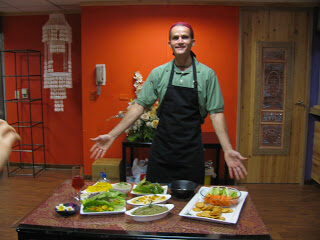Over the last 5 weeks, I have been developing a Food Yoga workshop based on my new book, FOOD YOGA – Nourishing the Soul (formerly: The YOGA of EATING).
The response has been positive thus far, and I am encouraged to think that with a little tweaking, I will have a very effective presentation on the art and science of being a Food Yogi.
“In these classes, I introduce the ancient tradition of spiritual hospitality, intertwined with the prasadarian lifestyle, which emphasizes consuming pure, compassionate food.”
A Prasadarian is someone who only consumes the most pure food, devoid of all suffering, toxins, and negativity. Prasadam is a Sanskrit word that means mercy, and specifically refers to food that has been prepared with loving intention and then offered in love to God. Naturally, such a gift of love must be physically and emotionally pure.
“Food, as a fundamental necessity, should be honored and shared. The Food Yogi lifestyle emphasizes compassion and ensures everyone has access to nourishing meals.”
This can only happen when we genuinely feel compassion and respect for all living beings, and it is this universal respect that is fundamental to a Food Yogi lifestyle. A Food Yogi sees with equal vision, a dog, elephant, poor man, rich man, woman, child, bird, or insect, knowing well that all are equal in spiritual quality, although appearing externally different. The wisdom of equal vision is most naturally expressed in the sharing of food, simply because eating food is something we all have in common, and no one should be denied.
Another pillar of the Vedic culture of spiritual hospitality is the policy of Atithi Narayan, or the attitude of treating an unexpected guest like God. Atithi is a Sanskrit word meaning unscheduled, and Narayana is a name of Visnu (God). The purport of this policy is obvious: If you are supposed to treat the unexpected guest like God, how much more should we respect those that we invite to our homes!? You can just imagine how wonderful the world would be if this policy were common law.
Probably the most important lesson from the Food Yogi workshop is the idea that when we make an effort to be fully conscious of our food choices, preparations, and eating, incredible and transformative things can happen to us.
When you are living consciously, beginning with conscious eating, you will do so in all your thoughts and actions. Your life will be consistent and in harmony with your environment. In other words, you will complement your environment and not disturb it. Rather than being a “spoke in the wheel” of Nature, you will be a welcome participant in the garden of unlimited possibilities.
Food’s only purpose is to nourish the body, mind, and soul. Food, therefore, should give us life, cleanse our bodies, and uplift our spirits. Eating food should never be just about fueling the physical body; it should always be viewed as an expression of consciousness.
“Spiritual awakening starts and ends with the tongue. The choices we make with our food and words are powerful, shaping our path as Food Yogis.”
What you put on your plate is as much a political statement as it is a mirror of who you really are. You can tell much about a person by what comes out of his mouth when he speaks and what he consumes as food. Food for Life founder Swami Prabhupada often gave the example of a dog on a throne. “If you throw a shoe, then the dog will leave his throne to chew the shoe,” he chuckled. Similarly, although an individual may claim to be enlightened or a great moralist, actions speak louder than words, and soon enough, those actions will always reveal their true nature.
The Bible says: “The tongue that brings healing is a tree of life, but a deceitful tongue crushes the spirit.”
The tongue will always lead the other senses either to purity and thus liberation, or to debauchery and thus perpetual entanglement in sin.
To be a Food Yogi is to walk in truth.
————————————————-
ABOUT THE FOOD YOGI WORKSHOP
Food Yogi Workshop is an introduction to the culture of spiritual hospitality and the importance of food on our spiritual journey. Students will learn how to achieve optimum health by practicing the Food Yogi diet and lifestyle, which includes what to eat, when to eat, water therapy, food meditations and conscious eating.
• The meaning of Food Yoga
• Metaphysics of food
• Nature Meditation
• Food Alchemy
• Sacred Food and Super foods
• The importance of water
• Thoughts are energy
• Food Politics
• Spiritual Hospitality
• Food Offering Meditation
• Conscious Eating
FAQ
Q: What is a Food Yogi?
A: A Food Yogi embraces a lifestyle that combines spiritual hospitality with conscious eating, focusing on compassion, purity, and respect for all living beings.
Q: What is the significance of prasadarian in Food Yoga?
A: Prasadarian refers to consuming food that is pure and prepared with loving intention, emphasizing compassion and spiritual nourishment.
Q: How does the Food Yogi lifestyle promote compassion?
A: By practicing conscious eating and sharing food with others, the Food Yogi lifestyle fosters universal respect and compassion for all living beings.
Q: What is Atithi Narayan in the context of Food Yoga?
A: Atithi Narayan is the practice of treating unexpected guests with divine respect, reflecting the Food Yogi’s commitment to kindness and hospitality.
Q: How does conscious eating transform one’s life?
A: Conscious eating encourages mindfulness in food choices and preparation, leading to personal growth and harmony with the environment.
Q: What role does food play in spiritual awakening?
A: Food is central to spiritual awakening, as mindful consumption and the power of words can significantly influence one’s spiritual journey.







Urvasi
You rock Food for Life Guy !
Priya 108
Thank you for the encouragement. You rock too Cow girl! Look forward to visiting the Goshala as soon as I get back to Aus.